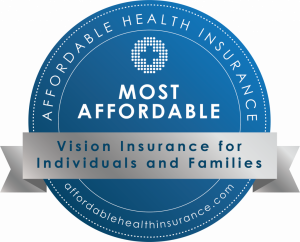Best Affordable Vision Insurance — Eye Insurance for Individuals and Families
Learn about affordable vision insurance coverage and find the best plan for your needs.

TABLE OF CONTENTS
- I. What You Should Know About Vision Insurance Options
- II. How We Rate Vision Insurance Companies
- III. How to Compare Vision Insurance Companies
- IV. What Is the Best Affordable Vision Insurance?
- V. Ameritas Vision Insurance: Best for comprehensive coverage options
- VI. Davis Vision Insurance: Best for network access
- VII. Direct Vision Insurance: Best for quick access to service
- VIII. EyeMed Vision Insurance: Best for immediate service
- IX. Humana Vision Insurance: Best for free exams
- X. UnitedHealthcare Vision Insurance: Best for marketplace access
- XI. VSP Vision Care Vision Coverage: Best for eyewear coverage
- XII. Sources

Eyes are your windows to the world, and vision insurance can help you protect them. With a good vision insurance plan, you’ll get help paying for exams, glasses, contacts, surgery, and other eye health services. Your options for vision insurance vary. You may have coverage through your employer or enroll in a Health Insurance Marketplace health plan that provides vision care. Medicaid, Medicare Advantage Plans, and your state’s Children’s Health Insurance Program (CHIP) may offer vision insurance.
Our editorial team compared insurance companies to find the best vision coverages. This guide reviews your options so that you can find the best vision insurance of 2022 — an affordable vision plan that suits your needs.
What You Should Know About Vision Insurance Options
- Typically separate from health: Your vision insurance usually isn’t part of your major health insurance plan.
- Medicare or Medicaid coverage: You may get a vision plan through Medicare or Medicaid.
- Consider your priorities: If you primarily need eye insurance for exams, a basic plan may suffice. But if you think you’ll need contact lenses, glasses,or LASIK, consider companies that offer more comprehensive coverage.
If you think you’ll need contact lenses, glasses, or LASIK, consider more comprehensive plan options .
| Vision Insurance Company | Financial Strength Rating | Customer Satisfaction Rating | Value Rating | Coverage Rating | Overall Rating |
|---|---|---|---|---|---|
| Ameritas: Best for comprehensive coverage options | 4.5 | 3 | 4 | 5 | 4.1 |
| Davis Vision: Best for network access | 3 | 5 | 5 | 5 | 4.5 |
| Direct Vision: Best for quick access to service | 3 | 5 | 5 | 4.9 | 4.5 |
| EyeMed Vision: Best for immediate service | 4.5 | 3 | 4 | 5 | 4.1 |
| Humana: Best for free exams | 4.3 | 5 | 5 | 5 | 4.8 |
| UnitedHealthcare: Best for marketplace access | 4.3 | 5 | 5 | 5 | 4.8 |
| VSP Vision Care: Best for eyewear coverage | 4.5 | 5 | 5 | 5 | 4.9 |
How We Rate Vision Insurance Companies
- Financial strength: The financial strength rating is based on the insurance company’s A.M. Best financial strength rating. A.M. Best is a credit rating agency specializing in the insurance industry, which rates an insurer’s ability to meet ongoing obligations.
- Customer satisfaction: The customer satisfaction rating takes into account each company’s Better Business Bureau (BBB), National Committee for Quality Assurance (NCQA), and Consumer Affairs ratings. These ratings are calculated using customer complaints and satisfaction ratings to identify the top vision insurance
- Value: The value rating calculates an insurer’s overall value based on monthly premium, annual deductible, office visit cost, emergency room (ER) visit cost, and annual maximum out-of-pocket cost.
- Coverage: The coverage rating considers the insurer’s availability of coverages, plan types, and network size.
How to Compare Vision Insurance Companies
Look at more than just the monthly premium: think about your total cost of eye care, everything from what you pay for the eye exam to glasses frames, if you wear contact lenses, or potentially need eye surgery.
Vision insurance policies vary in coverage, cost, network, and more, so it pays to compare your options for vision insurance plans. Look at more than just the monthly premium: think about your total cost of care. You may save money in the long run with a more expensive policy if it significantly reduces your out-of-pocket expenses.
Use the following checklist when comparing the cost of vision insurance:
- Find a service plan in your area: When reviewing insurance companies, make sure that they offer coverage to the state or county you live in. Some insurers only offer coverage to specific states or regions within a state.
- Research the network: Some policies only cover providers in the network. Make sure policies cover the providers you want to see.
- Compare monthly premiums: While you’re considering what you can afford each month, also review what you’re receiving for your premiums. The lowest cost isn’t always the best value.
- Compare copays: Some services, such as eye exams, require a copay.
- Understand coverage limits: Expect limits on how much the insurance company will cover. For example, you may have glasses or lenses covered, but only a certain allowance. You’ll be responsible for the remainder of the cost.
- Check insurer ratings: Check each company’s ratings with the BBB, A.M. Best, and online review sites. Finding out what other people think of an insurance company can give you an idea about what you can expect when you require service.
What Is the Best Affordable Vision Insurance?
There are several options for enrolling in a vision service plan. Here are the best ways that you can find a plan that covers your eye care:
- Employer insurance: Your employer may offer group coverage through health insurance or a separate policy. Not all offer vision coverage, so make sure you review your health plan to see whether your employer offers vision coverage. If it’s not covered, you can look outside of your employer-provided insurance.
- Health Insurance Marketplace: If you shop for health insurance through the Health Insurance Marketplace, you can search for policies that include vision coverage. Every ACA plan must include vision coverage for minor children, although the ACA doesn’t mandate adult vision coverage.
- Stand-alone policies: If your employer doesn’t offer vision insurance or you can’t find a marketplace plan with vision coverage, you can buy a separate vision policy.
- Medicare Advantage plans: Original Medicare includes Part A and B and doesn’t cover vision care. Medicare Advantage plans, administered by private insurance companies, often have vision coverage or the ability to add it.
- Medicaid: Medicaid is available to eligible individuals and families with low income. Some states cover eye exams and corrective lenses for all ages, and all states cover vision screenings for children and adolescents.
- Children’s Health Insurance Program (CHIP): Every state has a CHIP that provides coverage for a wide breadth of medical services. Children who qualify for the program receive coverage for eye examinations, glasses, contacts, and medical procedures that can be deemed medically necessary. If your child needs vision coverage and you cannot afford it, check with your state’s Medicaid program to determine if you qualify for CHIP.
Ameritas Vision Insurance: Best for comprehensive coverage options

Ameritas fulfilling life Health Insurance Overview
| Company founded | 1887 |
| Coverage area | All 50 states |
| A.M. Best rating | A |
| BBB rating | C+ |
| LASIK coverage | Yes |
| Waiting period | Not specified |
| Annual vision exam coverage | No |
| Glasses or contacts allowance | No |
| Provider network | Large |
Established in 1887, Ameritas offers the most comprehensive suite of coverage options available if you’re looking for vision insurance. While Ameritas offers extensive coverage options, you’re likely to pay more for a policy. Consider the following if you’re considering a policy from Ameritas.
Is Ameritas a Good Vision Insurance Provider?
| What we like about Ameritas vision insurance plans: | The drawbacks of Ameritas vision insurance policies: |
|---|---|
|
|
What Do Ameritas Vision Insurance Plans Cover?
Ameritas offers coverage for the following:
- Annual vision examinations
- Preventive care for common eye conditions and illnesses
- Corrective surgeries such as LASIK
- Eyeglasses and contact lenses, including frames
- Treatment of rare disorders
How is Ameritas Rated?
Trusted ratings and reviews can help you understand how an insurer’s vision plan stacks up against the competition. See how we rated Ameritas.
Overall rating: 4.1
| Financial strength rating: 4.5 |
Customer satisfaction rating: 3 |
Value rating: 4 |
Coverage rating: 5 |
Davis Vision Insurance: Best for network access

Davis Vision Health Insurance Overview
| Company founded | 1991 |
| Coverage area | All 50 states |
| A.M. Best rating | Not rated |
| BBB rating | A+ |
| LASIK coverage | Yes |
| Waiting period | 90 days |
| Annual vision exam coverage | No |
| Glasses or contacts allowance | No |
| Provider network | 104,000 in-network providers |
Established in 1991, Davis Vision is a growing vision insurance company that serves all 50 states. While a plan from Davis Vision can provide comprehensive coverage, you won’t be able to use your vision insurance for at least three months. You’ll also pay out-of-pocket for eyewear, such as glasses and contact lenses. Read on to understand what you can expect before you choose a plan from Davis Vision.
Is Davis Vision a Good Vision Insurance Provider?
| What we like about Davis Vision insurance plans: | The drawbacks of Davis Vision insurance plans: |
|---|---|
|
|
What Do Davis Vision insurance policies cover?
Davis Vision offers coverage for the following:
- Annual eye exams and preventive care
- Surgical procedures, such as LASIK, photorefractive keratectomy (PRK), and more
- Hearing screenings and treatment
- Ongoing treatment for vision problems and illnesses
How Is Davis Vision Rated?
Trusted ratings and reviews can help you understand how an insurer’s plans stack up against the competition. See how we rated Davis Vision.
Overall rating: 4.5
| Financial strength rating: 3 |
Customer satisfaction rating: 5 |
Value rating: 5 |
Coverage rating: 5 |
Direct Vision Insurance: Best for quick access to service

Direct Vision Health Insurance Overview
| Company founded | 1998 |
| Coverage area | All states except Alaska, Florida, Massachusetts, and New York |
| A.M. Best rating | Not rated |
| BBB rating | A+ |
| LASIK coverage | Yes |
| Waiting period | None |
| Annual vision exam coverage | Yes |
| Glasses or contacts allowance | No |
| Provider network | 157,000 in-network providers |
Established in 1998, Direct Vision offers vision coverage with no waiting period to most of the United States. You can take advantage of in-network and out-of-network benefits. Read on to learn what you should consider before purchasing a policy with Direct Vision.
Is Direct Vision a Good Vision Insurance Provider?
| What we like about Direct Vision insurance policies: | The drawbacks of Direct Vision insurance plans: |
|---|---|
|
|
What Do Direct Vision Insurance Plans Cover?
Direct Vision offers coverage for the following:
- Annual eye exams
- Optometrist-prescribed treatment of eye conditions
- LASIK corrective vision surgery
- Access to a large network of vision specialists
How Is Direct Vision Rated?
Trusted data and reviews can help you understand how an insurer’s plans stack up against the competition. See how Direct Vision compares.
Overall rating: 4.5
| Financial strength rating: 3 |
Customer satisfaction rating: 5 |
Value rating: 5 |
Coverage rating: 5 |
EyeMed Vision Insurance: Best for immediate service

EyeMed Health Insurance Overview
| Company founded | 1988 |
| Coverage area | All 50 states |
| A.M. Best rating | A |
| BBB rating | Not rated |
| LASIK coverage | Yes |
| Waiting period | None |
| Annual vision exam coverage | Yes |
| Glasses or contacts allowance | No |
| Provider network | 20,000 in-network providers |
EyeMed Vision began in 1988 and now offers policies to members across all 50 states. While you can access providers immediately after enrolling for vision insurance, there are some costs aside from the premium you’re responsible for that you need to consider. Before purchasing a policy from EyeMed, understand all of your options.
Is EyeMed Vision a Good Vision Insurance Provider?
| What we like about EyeMed Vision insurance policies: | The drawbacks of EyeMed Vision insurance policies: |
|---|---|
|
|
What Do EyeMed Vision Insurance Plans Cover?
EyeMed Vision offers coverage for the following:
- Regular eye examinations and preventive care
- LASIK and alternative surgical procedures for permanent vision correction
- Access to optometrists and vision specialists for treatment of serious eye conditions
How Is EyeMed Vision Rated?
Trusted ratings and reviews can help you understand how an insurer’s plans stack up against the competition. See how we rated EyeMed Vision.
Overall rating: 4.1
| Financial strength rating: 4.5 |
Customer satisfaction rating: 3 |
Value rating: 4 |
Coverage rating: 5 |
Humana Vision Insurance: Best for free exams

Humana Health Insurance Overview
| Company founded | 1961 |
| Coverage area | All 50 states |
| A.M. Best rating | A- |
| BBB rating | A+ |
| LASIK coverage | Yes |
| Waiting period | None |
| Annual vision exam coverage | Yes |
| Glasses or contacts allowance | No |
| Provider network | Large |
Is Humana a Good Vision Provider?
| What we like about Humana vision insurance plans: | The drawbacks of Humana vision insurance plans: |
|---|---|
|
|
What Do Humana Vision Insurance Plans cover?
Humana vision policies offer coverage for the following:
- Eye examinations
- Preventive care
- Surgical procedures such as LASIK or PRK
- A portion of the cost of your frames or lenses after you pay $150
- Treatment of eye conditions requiring ongoing care
How Is Humana Rated?
Trusted insight and reviews can help you understand how an insurer’s plans stack up against the competition. See how we ranked Humana.
Overall rating: 4.8
| Financial strength rating: 4.3 |
Customer satisfaction rating: 5 |
Value rating: 5 |
Coverage rating: 5 |
UnitedHealthcare Vision Insurance: Best for marketplace access

UnitedHealthcare Health Insurance Overview
| Company founded | 1977 |
| Coverage area | All states except New York |
| A.M. Best rating | A- |
| BBB rating | A+ |
| LASIK coverage | Yes |
| Waiting period | 90 days |
| Annual vision exam coverage | Yes |
| Glasses or contacts allowance | No |
| Provider network | 120,000 in-network providers |
UnitedHealthcare was formed in 1977 and serves most of the U.S. It offers a variety of services, including health insurance, dental coverage, and vision. The insurer boasts one of the largest networks of vision specialists. While highly rated for financial strength and customer service, there are drawbacks of UnitedHealthcare’s vision insurance, including some costs you’ll need to cover on your own. Here is what to consider before purchasing a plan from UnitedHealthcare Vision.
Is UnitedHealthcare a Good Vision Insurance Provider?
| What we like about UnitedHealthcare vision insurance plans: | The drawbacks of UnitedHealthcare vision insurance plans: |
|---|---|
|
|
What Do UnitedHealthcare Vision Insurance Plans Cover?
UnitedHealthcare offers coverage for the following:
- Treatment of eye problems and illnesses
- Surgical procedures, such as LASIK and PRK
- Glasses and lenses, up to an allowable amount
How Is UnitedHealthcare Rated?
Trusted ratings and reviews can help you understand how an insurer’s plans stack up against the competition. See how we ranked UnitedHealthcare.
Overall rating: 4.8
| Financial strength rating: 4.3 |
Customer satisfaction rating: 5 |
Value rating: 5 |
Coverage rating: 5 |
VSP Vision Care Vision Coverage: Best for eyewear coverage

VSP Health Insurance Overview
| Company founded | 1955 |
| Coverage area | All 50 states |
| A.M. Best rating | A |
| BBB rating | A+ |
| LASIK coverage | Yes |
| Waiting period | 90-day |
| Annual vision exam coverage | No |
| Glasses or contacts allowance | No |
| Provider network | 36,000 in-network providers |
Founded in 1955, VSP Vision Care is one of the largest vision insurance companies in the U.S., covering one out of every four people with vision insurance. Coverage includes your eyewear, though you may have a small copay for your annual vision exams. Understand your options when reviewing a plan by VSP Vision Care.
Is VSP Vision Care a Good Vision Insurance Provider?
| What we like about VSP Vision Care: | The drawbacks of VSP Vision Care vision insurance plans: |
|---|---|
|
|
What Do VSP Vision Care Vision Insurance Plans Cover?
VSP Vision Care offers coverage for the following:
- Preventive eye care, including ongoing treatment for common eye problems
- Corrective procedures that include options, such as LASIK or PRK
- Corrective lenses and contact lenses, including frames and lenses
How Is VSP Vision Care Rated?
Trusted ratings and reviews can help you understand how an insurer’s plans stack up against the competition. See how we rated VSP Vision Care.
Overall rating: 4.9
| Financial strength rating: 4.5 |
Customer satisfaction rating: 5 |
Value rating: 5 |
Coverage rating: 5 |

Tammy Burns is an experienced health insurance advisor. She earned her nursing degree in 1990 from Jacksonville State University, obtained her insurance billing and coding certification in 1995, and holds a health and life insurance license in Alabama, Georgia, Iowa, Mississippi, and Tennessee. Burns is Affordable Care Act (ACA)-certified for health insurance and other ancillary, life, and annuity products. She maintains an active nursing license and practices private-duty nursing.
Burns’ background as a nurse, insurance biller and coder, and insurance consultant includes infectious disease, oncology, gynecology, phlebotomy, post operative, family medicine, geriatrics, home health, hospice, human resources, management, billing, coding, claims, fixed annuities, group and individual health and life products, and Medicare. She’s always been driven by a desire to help people, spending more than 25 years as a practicing nurse in hospitals, private doctors’ offices, home health, and hospice. As a nurse, Burns supported patients filing insurance claims with Medicare, Medicaid, and private insurance companies as well as responding to billing questions from confused patients.
Seeing firsthand how unsuspecting patients are frequently confused by an overly complex system they don’t understand led Burns to become an insurance agent and health care consultant, now helping people understand the medical system. Since becoming an insurance agent in 2013, she has worked with some of the largest and most reputable insurance carriers and agencies in the nation, and she has built a large and loyal clientele by way of her commitment to transparency and personalized service.

Tammy Burns is an experienced health insurance advisor. She earned her nursing degree in 1990 from Jacksonville State University, obtained her insurance billing and coding certification in 1995, and holds a health and life insurance license in Alabama, Georgia, Iowa, Mississippi, and Tennessee. Burns is Affordable Care Act (ACA)-certified for health insurance and other ancillary, life, and annuity products. She maintains an active nursing license and practices private-duty nursing.
Burns’ background as a nurse, insurance biller and coder, and insurance consultant includes infectious disease, oncology, gynecology, phlebotomy, post operative, family medicine, geriatrics, home health, hospice, human resources, management, billing, coding, claims, fixed annuities, group and individual health and life products, and Medicare. She’s always been driven by a desire to help people, spending more than 25 years as a practicing nurse in hospitals, private doctors’ offices, home health, and hospice. As a nurse, Burns supported patients filing insurance claims with Medicare, Medicaid, and private insurance companies as well as responding to billing questions from confused patients.
Seeing firsthand how unsuspecting patients are frequently confused by an overly complex system they don’t understand led Burns to become an insurance agent and health care consultant, now helping people understand the medical system. Since becoming an insurance agent in 2013, she has worked with some of the largest and most reputable insurance carriers and agencies in the nation, and she has built a large and loyal clientele by way of her commitment to transparency and personalized service.
Sources
- Ameritas.com | Dental, Vision, and Hearing | Last accessed July 2024
- Directvisioninsurance.com | Affordable Vision Insurance | Last accessed July 2024
- Eyemed.com | EyeMed Individual and Family Vision Plans | Last accessed July 2024
- Healthcare.gov | Vision Coverage | Last accessed July 2024
- Humana.com | Humana Vision Insurance | Last accessed July 2024
- Medicaid.gov | Vision and Hearing Screening Services for Children and Adolescents | Last accessed July 2024
- Shiptacenter.org | Local Medicare Help | Last accessed July 2024
- UHC.com | Dental, Vision, and Supplemental Plans | Last accessed July 2024
- Visionplans.com | SuperiorVision vision plans | Last accessed July 2024
- VSP.com | Coverage Options | Last accessed July 2024
